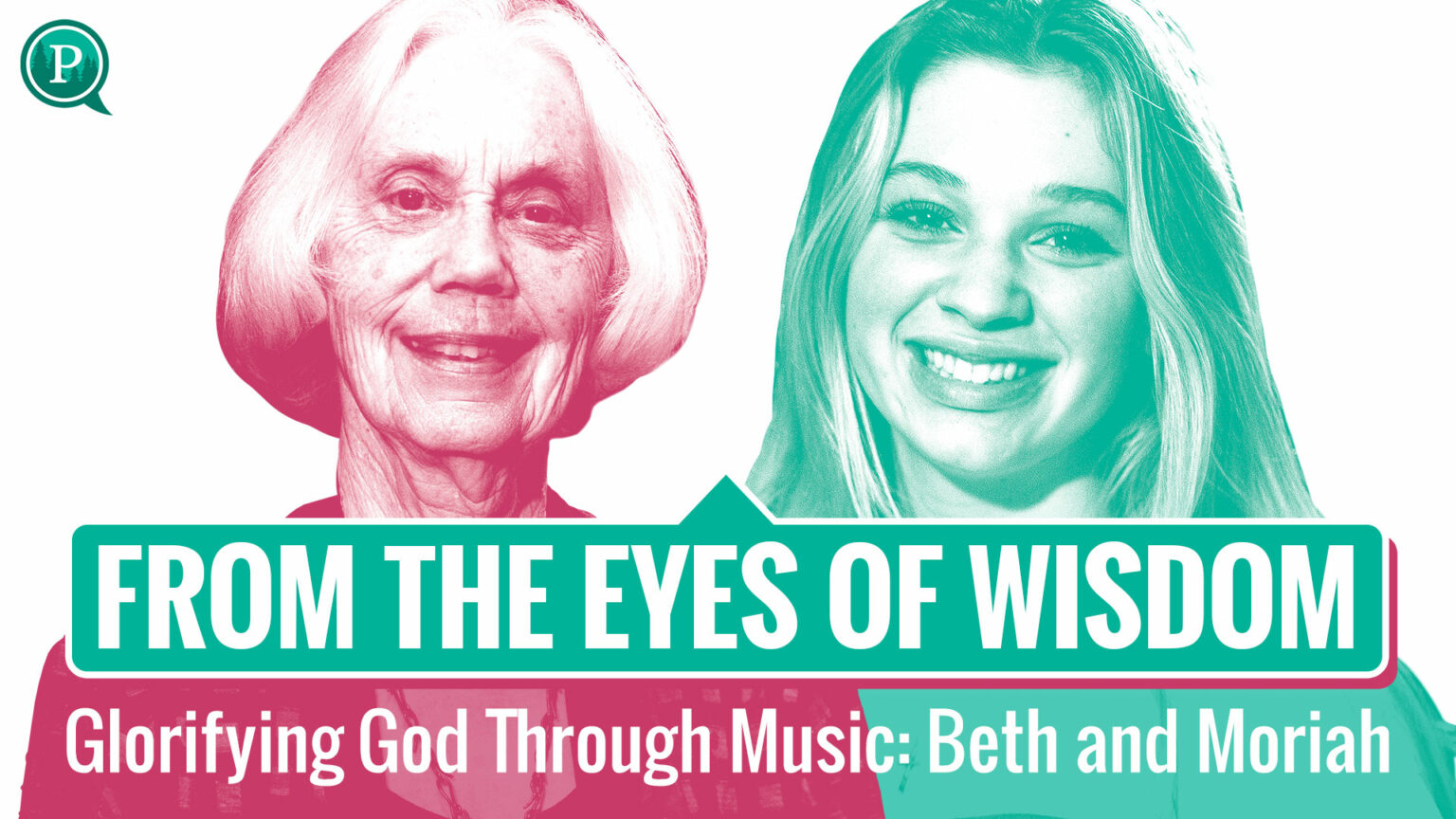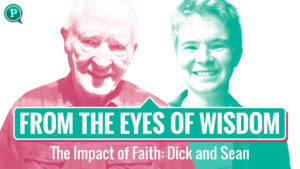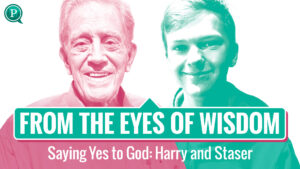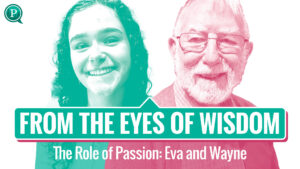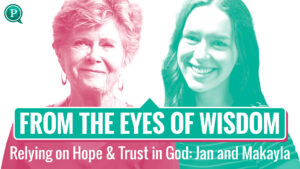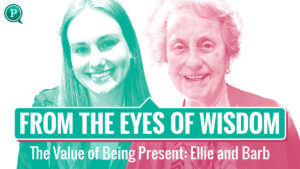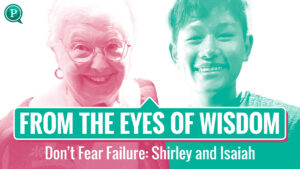Season 2 of From the Eyes of Wisdom is here! In our first episode Beth and Moriah connect over their shared experiences of using music for worship and connection. Beth talks about the importance of adapting hymns to different cultures and how she created a book to teach piano arranging to her students in Japan. Moriah, a high school student, shares her passion for performing arts and how it helps her connect with God. Beth gives Moriah some powerful advice about glorifying God through her performances.
Find Out More:
CRISTA Senior Living | King’s Schools | CRISTA Media | CRISTA Ministries
Transcription:
Sherri:
Have you ever wished you could know what the future held before you got there? What if you were given the gift of knowledge before you even began your journey? Now, I’ve been thinking about that because I made a lot of stupid mistakes when I was younger and I wish I had someone to say, “Don’t go down that road, go down this one.” I’m Sherri and welcome to From the Eyes of Wisdom where we are pairing an experienced elder from CRISTA Senior Living with a passionate King’s High School student ready to launch into the world. While these conversations won’t tell the future exactly, they did reveal a lot we weren’t expecting about how to live life well. Are you ready? I can’t wait for you to hear this.
All right, everybody, time for another episode of Through the Eyes of Wisdom. So glad to be here. Today, we have Beth with us and we also have Moriah with us. Thank you for joining us. All right, so we’re talking today of something that’s actually very near and dear to my heart, music and performing arts, which I love both. I’m very excited to have you guys here with us and we’re just going to talk about that, Beth, your very wonderful life in music and Moriah, your interest in performing arts, and just get some wisdom from Beth, questions from Moriah, just your interests, what you have in common and all of that. We’re going to talk about, okay?
Beth, talk about your mom, music, hymns and how that got you involved in music.
Beth:
Wow, all of that. Well, that’s for sure because my mom was a pianist and had been a Christian since high school. Then, she had studied piano as a young woman and then continued playing. She was currently … at the time I was little, under age seven, she was the pianist for the church that she and my dad attended. My mom wanted me to learn how to play the piano so she started teaching me probably from about age five or six, but then she knew that I should study with another, more professional teacher outside of her influence, so she got me started when I was seven years old but she also made it a point to request the teacher to help me learn to play hymns. From that early time, I said, “Well, let’s use our skills to honor the Lord and be able to serve in the church in some way.”
Sherri:
That’s Beth and her mom, right?
Moriah:
Yeah.
Sherri:
Tell me about you and your family, youngest age of thinking about music and performing. This is just what we love and what we do. What do you remember?
Moriah:
Well, what I remember is my family … both my parents did Young Life. They were on specifically the program team, so all the skits and things. My mom and dad would do a duo thing. They would be ones running it. I always had that performing gene in me. Specifically, music was more my dad. His granddad, who really inspired him for music, brought him into that music world and then brought me into the music world. A lot of singing growing up was singing country songs with my dad in the car and a lot of worship music, as well. In general, that’s the way I communicate with God and connect with Jesus is worship. I always have music playing in my car. I love dancing to music. Some of my favorite moments growing up was dancing in the kitchen with my dad just while we were making food. It’s always just intermixed in my life in different, important ways.
Sherri:
What is it about music that connects us so much, that makes it such a deep, rich experience? For you and your mom to have that, for you and your dad to have that, what is it? Why does it connect us so much? What do you think, either of you? I don’t know why. It just … it does. It’s in my family. It does.
Beth:
Music is meant to be shared. It’s something that comes out as sound but it’s organized sound and hopefully, it’s pleasant sound, or it can be, anyway. I think that’s part of it, that it invites collaboration. One of the things that I prayed when I moved here to Cristwood Park was that I would find people that I could be collaborating with in music. I really love playing piano duets. My mom and I used to do that. I’ve had a good time finding people along the way since I’ve been here, opportunity to do some concerts down at Cristwood Park with another person as a piano duet. That collaboration is, I think, really special.
Sherri:
It is. What do you think? Why do we connect so deeply with it?
Moriah:
I think it’s a beautiful art form. It’s truly an art form. I think whether it’s the lyrics or the music, the notes itself, it just evokes an emotional reaction for you. It can make you sad and connect with mourning, or it can make you really happy. The different notes that correspond with it can evoke emotion, as well. It’s very particular to each song, both in worship music, just those slower songs where you feel like … it’s more of that feeling, it’s slower and you’re really just feeling the presence of God, and in the happier ones. It’s just evoking that emotion that just makes you feel a certain way and connect with just everything you’re hearing.
Sherri:
You have the collaboration and then you have the emotion so that, if we’re collaborating together, then, when the emotion comes, we both felt that together.
Moriah:
Exactly.
Sherri:
Then, it’s like we had a shared emotional experience. That makes sense to me because theater is one of my favorite things in the world and why I love it is because of collaboration. It’s because this thing doesn’t work if we all don’t work together.
Moriah:
Exactly.
Sherri:
You can be fantastic at what you do, congratulations, but you better be good or nobody cares how good you are because, if you’re horrible, we will all go down in flames.
Moriah:
Exactly.
Sherri:
I think that collaboration and then us feeling emotion together is something that just … it unites. Tell me about hymns a little bit. I love hymns. If I could … I just love hymns. What do you think? I think we’re losing them a little bit. I don’t want to sound curmudgeony, I don’t want to be that person that’s like, “Oh, this newfangled worship music, take me back to the hymns.” I’m not being that person. There is something special about hymns.
Moriah:
100%.
Sherri:
What is it? Those songs … I remember my mother playing them. She still does, or my grandmother. What is it? Those songs that it’s … I don’t know. What … ?
Beth:
Well, a lot of those were carefully thought through in terms of the words for them. Interestingly, a number of hymns, like Joyful, Joyful, We Adore Thee or … the tune came from classical music: Beethoven, Bach, Brahms … some of those tunes by famous composers were borrowed by people in the church to say, “That’s a really good melody. We’re going to put these words to it.” A lot of people had heard the tune, and so they would continue to sing it.
One of the things that interested me in going to live in another country, in particularly an Asian country, was becoming aware of a different style of music and realizing that sometimes, our hymns … if we take the hymns that we’re familiar with in the United States and we think, “Well, everybody should sing those,” you take them wherever you go in the world and you think, “Well, this is how we sing to the Lord.” One of the things that I really like to see promoted is the development of hymnody in each culture.
Sherri:
Hymnody?
Beth:
The concept of creating hymns that people be encouraged to sing. There is a couple, the Gettys, that live in Ireland over the last, what, 30 years, I would guess? Keith and Kristyn Getty have been writing a new style of hymns. Maybe you’re familiar with some of those. We’ve incorporated a number of them into the church here in the United States. I’m just thinking that’s wonderful that it’s a newer style, comfortable, easy to sing but we honor people in different cultures for what they have to bring.
Sherri:
You have traveled, Beth. Tell me about your traveling and carrying this love of music, this understanding of music, this studying of music going to other countries, something that Moriah should be looking for or eyes open, ears open, thinking about.
Beth:
Well, what I’m thinking back to was the very first mission trip that I went on. I was a student and I lived in southern California but we then went into northern Mexico and across the border. We were expecting to sing in Spanish, and I loved that. I was excited about that. As we went, we’d learned some of the choruses in Spanish and we’d learned … not American music, but we learned some Latin American worship music. To me, that was exciting to realize, “Oh, yeah, it’s different,” but they’re worshiping God and we can learn from that. To me, it was just an expanding of a horizon. Of course, as a musician, that’s great. You’d learn something new in music, you’d take it in and do more with that.
Sherri:
I love that idea of, “What can I learn? I can learn something from this.” That’s good. All right, what can I learn from this?
Beth:
Thank you. I’m glad you see that in it. “What can I learn from you?”
Sherri:
Yes, that’s good. [inaudible]
Beth:
The learning attitude takes you into all kinds of adventures.
Sherri:
One of the things you talked about, Beth, in your pre-interview that I thought was so interesting, and I really wanted Moriah to get this because, being a creative myself, I was like, “Yep, I understand that,” is that you were talking about … you’re in college. I think originally, you were thinking about a career in music or were you thinking about becoming someone’s musician, a church musician or something like that?
Beth:
Looking for that, [inaudible]
Sherri:
The love and the passion you have for it doesn’t always translate to-
Beth:
Career.
Sherri:
…a career, yes, but that doesn’t necessarily have to, and it shouldn’t, put out the fire of the passion. It seemed like in your life, you did other things, but the passion for the music was still there. Can you talk about … You met your husband in seminary, is that right?
Beth:
That’s right.
Sherri:
Talk a little bit about that and then what the two of you began to do.
Beth:
Well, I was interested in music in a cross-cultural setting, just trying to think about what that would mean elsewhere, and really had an interest in ministry in another culture. I didn’t know where that might be. In going to seminary, I felt this was good training for whatever I might do in the future. Went to a seminary seniors’ conference back in Wisconsin where there were seniors from seminaries all over the US. My husband was from Pasadena, from Fuller Seminary, and I was from a different seminary in southern California, but we enjoyed chatting together, talking and got better acquainted. Then, when we came back to southern California to finish our schooling, it wasn’t that far away that we were able to visit and got better acquainted.
Sherri:
You guys get married and then what? You go on an adventure together, or … ?
Beth:
Well, we certainly did, yes, because he’d become a Christian through somebody within Campus Crusade that had come and served on his campus where he was studying. Through that, also became interested in Japan and had gone to visit the person who had developed the ministry, the Japanese man. Bob really did want to go back to Japan. I thought, “Well, that’s interesting,” and I hadn’t thought about Japan before but, as we talked about it and prayed about it, I thought, “All right, this is a good direction for us to go.” We were involved in campus ministry there but I quickly got involved and was interested in just what was happening in music, what were people singing in the church and how could we do that?
Sherri:
You go there, how do you begin to learn what the music is? How do … You just sit and listen?
Beth:
That’s right. That’s exactly right. That’s what we chose to do. We felt that would be important, that we’ll be involved in the local church here. We were there to learn, to just get along and understand how they worshiped. For me, that was really interesting because some of the tunes that they sang were ones that they learned from Westerners and those were horrible. They had Japanese words to them. Then, there were new texts, new music and new style. It was good to me. I just enjoyed learning that very much. Appreciated [inaudible]
Sherri:
Tell me about the … there was a book that you created. What was that when you were there?
Beth:
Well, one of the things that I was particularly interested in was training church musicians. How do we do that and help them? One of the things I liked to do was arrange hymns. I’d take a hymn tune, but then I’d change the chords or add a different little rhythm to it, whatever else. I thought, “Well, how can I encourage my students?” I ended up for 10 years teaching in a Bible school in Tokyo. My students all had to learn to play the piano as they came through this Bible school program but then, I would work with them in the hymnal and then encourage them to make up and try to show them, “This is how you change around the tune or add notes here or there, put some different chords.” That’s what happened was that I then … you won’t be able to read very much on here, you might be able to-
Moriah:
[inaudible]
Beth:
… find my name in English somewhere in there, but it was just how to do piano arranging.
Sherri:
Wow.
Beth:
It was just giving them ideas.
Sherri:
It was for your students in-
Beth:
For my students.
Sherri:
… The opportunity is there-
Beth:
The opportunity is there.
Sherri:
… and that creates the passion to create.
Beth:
Then, the passion to … yeah.
Sherri:
I love that.
Beth:
What’s needed? Is it just being the example and teaching, or is there … There wasn’t anything like this available to use where, if you took basic piano lessons or whatever, there were all kinds of systems out there, you could go to the bookstore and start buying books here, there and yon about how you learn how to play but, in Japan, there wasn’t anything like this available for church musicians.
Sherri:
It’s more like, “What’s the need and how can I be an answer to that need?”
Beth:
That’s it.
Sherri:
“How can I be [inaudible]-”
Beth:
I think that …
Sherri:
… Tell me what you think about that.
Moriah:
I think that is so creative that you just were like, “Okay, there’s a need and I’m going to fill that need.” That is wonderful and you’ve touched so many kids’ lives with just this book. I think that’s absolutely amazing. That’s the reason, though, why I like to do what I do, which is performing arts and theater, is the fact that I’m able to touch people’s lives, even for two hours, two and a half hours, just give them that joy and have them just have a fun afternoon. It’s what makes me just love what I do so much.
Beth:
Oh, yeah. You sense, don’t you, the emotional connection?
Moriah:
Yes.
Beth:
When you’re providing that moment of joy, or of emotion. It can be full of pathos, concern, anxiety or whatever that is in what you’re singing. It draws on that from the listener.
Moriah:
100%.
Beth:
For them to learn, but then they remember that, and that’s another part. I think, especially when in performing arts, those memories … we think back on when we’ve gone to different kinds of concerts or whom we’ve heard sing. That’s in there. That’s a clip in the memory, in the brain, that’ll come back and they can remember, “Oh, once I heard this [inaudible] sing and loved what she sang and the way she sang it, and just your whole attitude in singing.”
Moriah:
It truly gives me so much joy when people … even months, I see someone just randomly and they’re like, “Oh my gosh, you did amazing in … ” for example, I did Mary Poppins last spring. Oh my gosh. It was-
Beth:
Well, that’s where I would’ve seen you then because I came to that.
Moriah:
… Oh, yes. You came to that? Yes. I [inaudible]
Beth:
I came to that. Oh, yeah.
Moriah:
Yes, I was the Bird Woman. I sang Feed the Birds.
Beth:
Oh, that’s right. Oh, I love that song.
Moriah:
Thank you so much.
Sherri:
You and your husband have this life in Japan. How long were you there?
Beth:
A total of 20 years, although we spent some additional years in the US training other people. My husband came back and studied at Fuller Seminary, then got involved in an actual group that worked with establishing a church growth institute in Japan. He was involved quite a lot with that.
Sherri:
How many children did you have?
Beth:
We have two.
Sherri:
Two children.
Beth:
We have a son and a daughter.
Sherri:
I’m guessing you had them over there when you were-
Beth:
Our son was six months old when we first went. Amazingly, and this is God’s provision for us, the first home that we had in central Tokyo, where homes are tiny, tiny and close, close together, the people that lived next door to us … it was a Japanese family but they had just come back from spending six months in Los Angeles, so they spoke a little English, which was perfect because I didn’t speak any Japanese yet. We got to know each other. Then, they had a little boy who was close in age to my son.
Moriah:
Oh my gosh
Beth:
So, those little boys could-
Sherri:
… Look at that.
Beth:
… the provision.
Moriah:
The Lord’s provision is-
Beth:
It’s amazing.
Moriah:
… It’s amazing.
Beth:
[inaudible] doubt it.
Moriah:
Actually, my name means, “The Lord will provide.” It’s from the story of Abraham and Isaac, the land of Moriah. That was the reason reasoning of my name is just my parents couldn’t have kids for seven years and I was a miracle baby. My parents didn’t even have Moriah on the table and the Lord spoke to my dad very clearly on kayaking trip. The Lord just speaks to him so clearly that my name should be Moriah because of its meaning.
Beth:
Isn’t that exciting?
Sherri:
How many siblings do you have?
Moriah:
I am also the oldest. I have two younger siblings. My brother is a freshman here at King’s, and my sister is in sixth grade at a school called Villa Academy over in Laurelhurst area, where I used to live.
Sherri:
All right. You and your husband were married how long?
Beth:
56 years. He passed away year and a half ago.
Sherri:
I’m sorry. 56 years?
Beth:
Mm-hmm,
Sherri:
You stayed 20 years in Japan, then you came back here and you were where? Back to southern California?
Beth:
We were in southern California until about 20 … we moved up here about 20 years ago to Cristwood Park.
Sherri:
Then, you had some trauma in your life. Whatever you feel comfortable talking about.
Moriah:
Yes, I’m very open to talk about anything. I lost my mom. Let’s see … May of 2020, so that was almost three years ago. We actually came to [inaudible] … it was all during COVID which honestly was a blessing in disguise because I didn’t have to go back to school after it happened, which was pretty nice. Then, we actually came to King’s. I was originally set to go to Roosevelt in the university area. That’s where I live, in the U District. I was set to go there. Then, some of our very close friends were like, “Hey, maybe you should check out King’s,” because my dad was a newly … a single dad. Just getting that support of a small Christian school. I didn’t want to come to a small school again. I had a horrible experience coming to a small school because I couldn’t make any friends, but we came to King’s and it has been the most amazing blessing. I absolutely love it here and I’m happy. I have a lot of amazing friends.
Beth:
I’m happy to hear that.
Moriah:
Yes.
Beth:
I’m sorry.
Sherri:
You asked a question in your pre-interview … they asked you, “What would you ask Beth?” You asked a question that I thought was interesting. It was something along the lines of how music and your faith helped you through loss, something like that.
Moriah:
Yeah. I think I was asking how you used music through different points in your life, whether through loss or through happiness, how you used music to express your feeling or how you process, because I use music a lot to process.
Beth:
That’s a really good question because that happens too, very much. My mom was so instrumental in getting me going in music and so, at the point of her homegoing to Heaven, I just was thinking, “What do we celebrate?” Remembering the special songs that she liked. I think especially the more poignant loss has been for my husband’s leaving two years ago … well, a year and a half, two years ago. He didn’t feel like he had a good singing voice but he loved music. We had always shared-
Moriah:
That was my mom.
Beth:
… I used music in thinking back and being grateful for his life and the life that we shared together. I know that I’ll continue to do that. I think music has a really important part in bringing healing.
Moriah:
100%.
Sherri:
I remember my grandmother was a very, very, very, very musical person. I didn’t think I realized how musical he was, how good she was at it or how … she didn’t [inaudible] … I didn’t know her that way, I’ll put it that way, until there was a very popular photographer of her day who had his work on display in a museum. Someone was sending me all the different prints and stuff, copies of the prints, and my grandma was all over. That means it was a thing to get her picture.
Moriah:
Oh my gosh.
Sherri:
It was all of her different plays, her musicals and her [inaudible] … I guess I didn’t understand how popular she was, but I just remember her homegoing service really feeling what you said, which is you know that they’re with Jesus, you’re hurting, but you want to celebrate, and music is that thing. It goes back to what we started talking about. It’s that thing that ties it together that both allows you to mourn and celebrate.
Moriah:
100%.
Sherri:
I just don’t know [inaudible]-
Beth:
There you go.
Sherri:
… Yeah.
Beth:
It just seems like an odd combination, but-
Sherri:
It does.
Beth:
… it’s true. It’s a gamut. Very distinct experiences, but certainly part of the whole.
Sherri:
Isn’t it amazing how God loves us?
Moriah:
Yeah.
Sherri:
I think music is one of those things that’s like … He must really love us to give us that, that we get to experience that. Then, you get to play. You still play the organ, am I right? Did I hear that right?
Beth:
You did. I’m still the organist of the church that I’ve been a part of almost 20 years.
Sherri:
Ladies, this has been wonderful. I love talking about music, talking about its effects on us, what God allows us to create and what He allows us to enjoy. I hope you’ve gotten some wonderful wisdom from Beth.
Moriah:
Yes.
Beth:
Well, it’s fun to collaborate, to share each other’s expressions and experience.
Sherri:
And passion.
Beth:
And joy. That’s what’s fun. It’s delightful to see younger generation … yes. You’ve caught the bug, the music bug. [inaudible] enjoy, the performing and see that in a positive way, not in a self-focused way, but of the joy that it brings other people, [inaudible]
Sherri:
She’s already written some stuff down, but I’m going to put you on the spot and say she’s going to carry that card with her all through her life. I believe that she’s-
Moriah:
I will.
Sherri:
… going to have it when she’s 25, 35, [inaudible] remember this card, that Beth gave me this wisdom.
Moriah:
It’s amazing.
Sherri:
If there’s one thing that you could impart to her, one word of wisdom, one thing, “Moriah, if you don’t remember anything, remember this,” what would it be?
Beth:
I think it is do all to glorify God. That what we do, we want to honor God with it. That’s if we prayed about it, sought wisdom or have enthusiasm for people’s lives to change because of what we’re doing, that does it.
Sherri:
I love that.
Moriah:
Thank you so much, Beth.
Sherri:
If I can piggyback off that, specifically in this kind of arena, when you do things that get you, just by virtue of what you do, applause, that’s going to be very important because, if you’re not doing that, that applause will get in here and it has the possibility to do that.
Beth:
It does, doesn’t it?
Sherri:
It does.
Beth:
To distract.
Sherri:
Yes.
Beth:
Then, your reason is just to pump up yourself rather than to introduce God’s love or help people find Jesus.
Sherri:
It happens quick. It can happen quickly and you almost don’t even know it. For what you want to do, what she just said … it seems simple, but it’s probably one of the greatest pieces of advice you will ever get and, if I were you, I’d get that printed in all different kinds of-
Beth:
Oh, it’s in her Bible, though. [inaudible]-
Sherri:
… Yeah, get it big, put it all-
Beth:
… Do all to glorify God.
Sherri:
… over the walls and everywhere. Put it in your dressing room, wherever you are, and remind yourself He gets the glory, not me.
Beth:
He gets the glory.
Moriah:
Yes, ma’am.
Sherri:
He gets the glory. Thank you everyone for tuning in once again and we’ll see you next time, unless this is the last one and, if it’s the last one, we’ll never see you again.
Moriah:
Until next season.
Sherri:
Until the next season.
Beth:
Until next season.
Sherri:
Through the Eyes of Wisdom. Thank you, all.
Follow this podcast:

